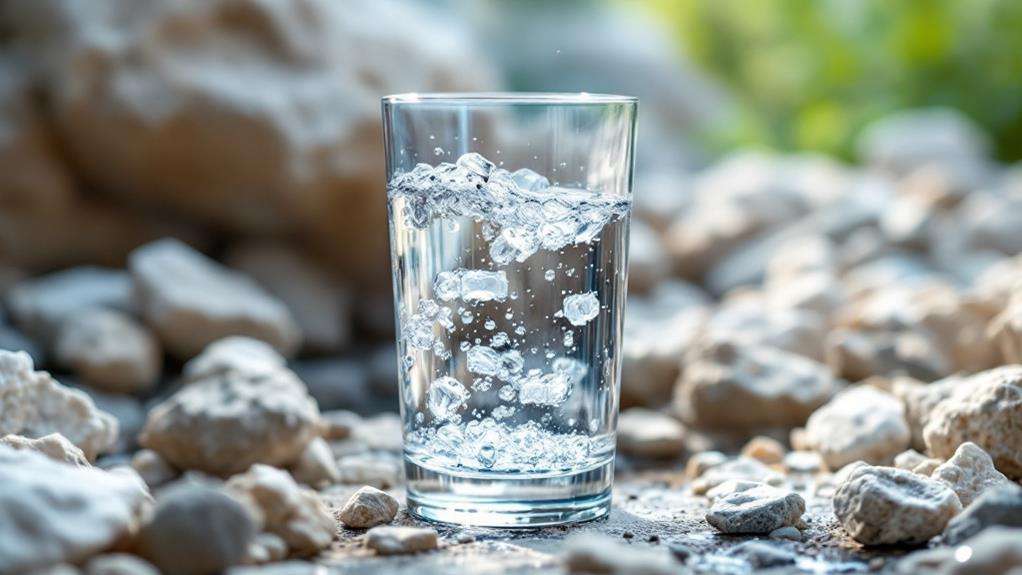How to Filter Your Water Without Losing Essential Minerals
To filter your water without losing essential minerals, choose a filtration method that balances contaminant removal with mineral retention. Activated carbon filters effectively remove chlorine and heavy metals while preserving beneficial minerals. Ion exchange water softeners can reduce hard water minerals without stripping all nutrients. If you use reverse osmosis, consider adding a remineralization filter to restore essential minerals. Alternatively, combine different filtration methods to achieve ideal results. Remember that tap water's mineral content is minimal compared to dietary sources, so focus on overall water quality and taste. By understanding various filtration options, you'll be better equipped to make the right choice for your needs.
Understanding Water Filtration Methods
When it comes to water filtration, understanding the various methods available can help you make an informed decision about which system is right for your needs. Water filtration systems come in different types, each with its own strengths and limitations.
Activated carbon filters are effective at removing chlorine, sediment, and some organic compounds, but they don't remove dissolved minerals like calcium and magnesium. These filters are a good choice if you want to improve taste and odor without altering mineral content.
Reverse osmosis systems are highly effective at removing contaminants, including minerals. However, this means they also strip away beneficial minerals from your water. If you choose this method, you might need to remineralize your water or supplement your diet to compensate for the loss.
Ion exchange systems are designed to soften water by replacing calcium and magnesium ions with sodium or potassium ions. While this process doesn't remove minerals entirely, it does alter the mineral composition of your water.
Understanding these methods will help you choose a water purification system that balances contaminant removal with preserving essential minerals, ensuring you get clean, healthy water that meets your specific requirements.
Essential Minerals in Drinking Water
In the domain of water quality, crucial minerals play a pivotal role in both taste and health advantages. Your tap water naturally contains minerals like calcium, magnesium, sodium, and potassium, which are essential for your body. While these minerals aren't unpleasant to drink, they're not required to meet your daily nutritional needs.
When you're considering water filtration methods, it's important to understand how they affect mineral content. Reverse osmosis (RO) filtration, for example, can remove beneficial minerals along with contaminants, resulting in demineralized water. However, studies show that the contribution of minerals from tap water is minimal compared to other dietary sources, so drinking RO-filtered water isn't a significant health concern.
If you're worried about losing minerals during purification, you have options. Remineralization filters can be added to your water treatment system to restore essential minerals like calcium and magnesium to RO-filtered water. This approach combines the benefits of thorough purification with mineral retention, ensuring you're drinking clean water that still contains some beneficial minerals. Ultimately, the choice of filtration method depends on your specific water quality needs and preferences.
Reverse Osmosis and Mineral Loss

Reverse osmosis (RO) filtration is a double-edged sword when it comes to water purification. While it's highly effective at removing contaminants, it also strips away essential minerals from your drinking water. RO water filters can eliminate up to 99.9% of dissolved substances, including beneficial minerals like calcium, magnesium, and potassium.
When you use RO filtration systems, you're faced with a trade-off between purified water and mineral content. The process forces water through a semipermeable membrane, leaving you with water that's free from most impurities but also devoid of essential minerals. This can be problematic if you rely solely on RO-filtered water for your daily intake, as it may lead to mineral deficiencies over time.
To address this issue, you have a few options. You can use remineralization filters or add mineral supplements to your RO-filtered water. These methods help restore the mineral balance, ensuring you're not missing out on pivotal nutrients. Alternatively, you can diversify your mineral sources by consuming a balanced diet rich in essential minerals. By taking these steps, you'll enjoy the benefits of purified water without compromising your mineral intake.
Activated Carbon Filtration Benefits
A glass of clean, mineral-rich water is within reach with activated carbon filtration. This method effectively removes chlorine and heavy metals while preserving the beneficial minerals in your water. Unlike reverse osmosis, Carbon Filtration doesn't strip away necessary minerals, ensuring you still get healthy minerals like calcium from your drinking water.
Activated carbon works through adsorption, attracting contaminants to its porous surface while letting minerals pass through. This process improves taste and odor by removing compounds that affect water's flavor. You'll notice a significant difference in your water's quality without sacrificing its natural mineral content.
Integrating activated carbon into your home water system is a cost-effective and low-maintenance solution. You'll enjoy:
- Crisp, invigorating water free from chlorine taste
- Peace of mind knowing harmful contaminants are removed
- Preserved mineral balance for ideal health benefits
- Improved flavor in beverages and cooking
- A sustainable, eco-friendly filtration method
Ion Exchange Water Softeners

Tackle hard water problems while preserving essential minerals with ion exchange water softeners. These innovative water filtration systems effectively remove hard water minerals like calcium and magnesium ions through a physical ion exchange process. Unlike some other filtration methods, ion exchange softeners don't strip your water of all beneficial minerals, ensuring you still receive critical nutrients.
When you use an ion exchange water softener, it replaces hard water minerals with sodium or potassium ions. This process drastically reduces scale buildup in your pipes and appliances while improving overall water quality. You'll notice softer water that's gentler on your skin, hair, and clothes.
To maintain ideal performance, you'll need to regularly regenerate the ion exchange resin in your water softener. This maintenance guarantees continued effective water softening and helps preserve the system's longevity. While ion exchange softeners excel at removing specific minerals, they don't substantially reduce the overall mineral content of your water. This means you can enjoy the benefits of softened water without sacrificing the essential minerals your body needs. By choosing an ion exchange water softener, you're investing in a solution that balances mineral removal with retention of beneficial elements.
Mineral-Preserving Filtration Options
While ion exchange water softeners offer an effective solution for hard water, they're not the only option for maintaining mineral balance in your drinking water. Several mineral-preserving filtration options can help you achieve clean, healthy water without sacrificing essential minerals.
Activated carbon filters are an excellent choice for removing contaminants while retaining beneficial minerals like calcium and magnesium. If you're concerned about bacteria, UV light filtration can disinfect your water without affecting its mineral content. For a more all-encompassing approach, consider a dual-stage filtration system that combines mechanical and absorption filters to remove impurities while preserving minerals.
If you already have a reverse osmosis system that uses a semipermeable membrane to filter water, you can add essential minerals back using mineralization filters or alkaline water pitchers. These options help restore the mineral balance that may be lost during the filtration process.
When choosing a WATER FILTER SYSTEM, consider the following:
- Does it remove harmful contaminants without stripping essential minerals?
- Will it improve the taste and odor of your tap water?
- Is the filtration method suitable for your specific water quality needs?
- How often will you need to replace filters or maintain the system?
- Does it provide a good balance between purification and mineral retention?
Remineralizing Filtered Water

After filtering your water to remove contaminants, you may need to ponder remineralization. Reverse osmosis and distillation filters can strip beneficial minerals like calcium and magnesium from your water, making remineralization an essential step in your water treatment process.
You can restore these crucial nutrients using remineralization filters that employ advanced PPC technology. These filters activate the crystalline mineral structure, simulating natural mineral spring formation to augment your water. By doing so, you're not just drinking purified water; you're consuming mineral-rich water that can provide numerous health benefits.
Remineralized water can improve your bone health, heart health, and digestion. It can also enhance your skin quality, making it a superior choice to purified water lacking essential minerals. When selecting a water filtration system, aim for one that balances contaminant removal with mineral retention.
Choosing the Right Filtration System
When it comes to choosing the right filtration system, you'll need to ponder several factors. Different Filtration Systems Remove various water contaminants, so it's vital to understand your water supply's specific needs. Consider the type of water filtration that'll provide you with clean drinking water while preserving the good minerals in water.
To guarantee you're making the right choice, evaluate these key points:
- Your local water quality report
- Your budget for initial costs and maintenance
- The system's capacity and flow rate
- Its effectiveness in removing specific contaminants
- The potential impact on mineral content
FILTERED WATER should offer both safety and health benefits. Some systems might strip away essential minerals, so look for options that maintain a balance. Reverse osmosis, for example, is highly effective but may require remineralization. Activated carbon filters, on the other hand, can remove many contaminants while retaining minerals in water.

